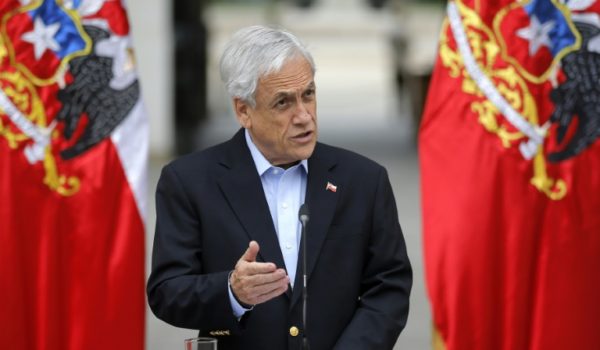Chile President ends state of emergency
Mon 28 Oct 2019, 12:51:53

Chilean President Sebastian Pinera today ended a state of emergency that lasted more than a week amid mass protests. However the demonstrations continued even after the lifting of emergency.
A message on the presidency's official Twitter account said the state of emergency would end in all the regions and towns where it was established. The situation had seen 20,000 soldiers and police deployed on the streets. This measure came a day after Pinera said he had asked all ministers to resign in order to form a new government. The decision came two days after more than a million people took to the country's streets demanding economic and political changes.
Authorities imposed both the state of emergency and curfews last weekend after Chile was rocked by its worst civil unrest in decades. What originated as a student protest against a modest hike in metro fares quickly got out of control as demonstrations turned deadly. But demonstrations continued on Sunday as thousands of people marched to the seat of Congress in Valparaiso, 120 kilometers west of the capital Santiago. At least 20 people died in the worst political violence since Chile returned to democracy after the Augusto Pinochet dictatorship from 1973-1990.
The government has been struggling to craft an effective response to the protests and a growing list of economic and political demands that include Pinera's resignation.
Demonstrators are angry at Chile's neo-liberal social model, low salaries and pensions, high health care and education costs, and a yawning gap between rich and poor.
Demonstrators are angry at Chile's neo-liberal social model, low salaries and pensions, high health care and education costs, and a yawning gap between rich and poor.
Billionaire Pinera, who assumed office for a second time in March 2018, had already shuffled his cabinet twice in 15 months as doubts grew about a slowing economy and his leadership. He offered a raft of measures earlier this week aimed at calming the public ire, including an increased minimum wage and pensions, some reductions in health care costs, and a streamlining of parliament.
The week of unrest began with an initial burst of violence as protesters and looters destroyed metro stations, torched supermarkets, smashed traffic lights and bus stops, and erected burning street barricades.
The police and army troops have been accused of using unnecessary force in putting down the protests. The United Nations is sending a team to investigate allegations of abuse.
The street movement still lacks recognizable leaders and was mostly roused through social media, which analysts say makes it harder for the government to negotiate any resolution.
There were fears that continuing protests could put at risk the Asia Pacific Economic Cooperation , APEC trade summit in Santiago from November 16-17, but the government said that it would go ahead.
No Comments For This Post, Be first to write a Comment.
Most viewed from International
Most viewed from World
AIMIM News
Latest Urdu News
Most Viewed
May 26, 2020
Do you think Canada-India relations will improve under New PM Mark Carney?
Latest Videos View All
Like Us
Home
About Us
Advertise With Us
All Polls
Epaper Archives
Privacy Policy
Contact Us
Download Etemaad App
© 2025 Etemaad Daily News, All Rights Reserved.

.jpg)
.jpg)
.jpg)






.jpg)


.jpg)
.jpg)
.jpg)
.jpg)
.jpg)
.jpg)
.jpg)
.jpg)
.jpg)
.jpg)
.jpg)
.jpg)

















